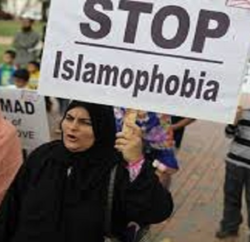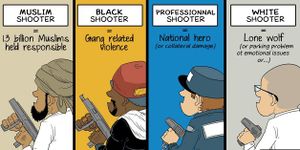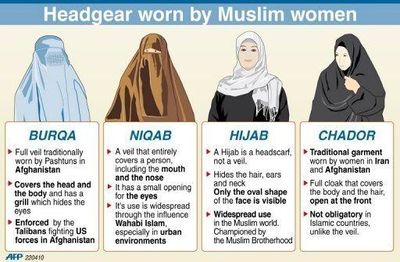Rise of Islamophobia in the USA
Definition
Islamophobia [[1]] is defined as prejudice and discrimination towards Muslims and has seen an exponential rise in the United States after the tragic events of 9/11. Today, there is a "growing concern among many Americans that practitioners of the Muslim faith are fundamentally irrational, intolerant, and violent" (Johnson 166)[1], but most people with this opinion have little to no knowledge of the Islamic faith and are just echoing beliefs that are prevalent in mainstream society. Scholars agree that the rise of Islamophobia is due to a combination of high Muslim immigration rates and extreme terror events, like 9/11. Many people that are unfamiliar with Muslim traditions and customs view them as inherently inferior or incorrect [2], without attempting to understand Islamic culture. Islam is a monotheistic religion that is currently the third largest faith in the United States [[2]], which accumulates to just under 1% of the national population and constitutes one of the most racially diverse religions.
Post 9/11
9/11 is still the deadliest terrorist attack on American soil and was conspired by al-Qaeda, a radical terrorist organization. The effects of 9/11 impacted Americans tremendously, leading to an increase in protectionist measures and a growing apprehensive disdain for Muslims. This terrorist group led by Osama bin Laden, preached a fundamentalist doctrine that is very different from the intentions of Islam, but the general public often wrongly correlates religious fundamentalism with the Islamic faith. 9/11 saw Muslim Americans go from being an invisible group into a highly visible religious group that, according to some Americans, threatened the nationhood. [3]
Islamic Fundamentalism
Islamic fundamentalism[[3]] has seen an increased presence in mass media coverage, but this does not equate to fundamentalism being a widespread belief amongst Muslims. Islam is often portrayed as being the lone religion with such extremist groups, but these terrorist organizations (al-Qaeda, ISIS, and the Hamas) are not indicative or representative of Islam. Islamic fundamentalists inherently believe that they are following the intended doctrine of the Quran, but in reality they are using Islam as an excuse for their egregious behaviour and igniting fear in the USA towards Muslims. The proportion of Muslims to terrorists is very slim, but the numerous terrorist attacks claimed by the Islamic State of Iraq and the Levent (ISIS/ISIL) may misconstrue the facts. Americans have this misconception that the expedited growth of radical Islam is due to the presence of Muslims in America, but all Muslims cannot be vehemently blamed for the actions of a very small number of people who uphold a strikingly different Islamic faith.
War on Terror
The War on Terror [[4]] was introduced by the Bush administration and gained traction after the tragedies of 9/11 to combat radical terrorist organizations. These counterattacks were aimed in Muslim majority countries, Afghanistan and Iraq, and President Bush proclaimed that the War on Terror "will not end until every terrorist group of global reach has been founded, stopped, and defeated" [4]. This war has resulted in an accumulated economic debt of $2 trillion for the United States and remained active until President Obama "campaigned on defence reduction" in order to combat impending economic destitution[5].
Trump's Contribution to Islamophobia
Leading up to the 2016 USA Presidential Election, Donald Trump spearheaded a campaign founded on emphasizing the fears of American citizens. Trump has criticized and discriminated against a multitude of minority groups including, but not limited to, African-Americans, Mexicans, immigrants, disabled people, women, the transgender community, and Muslims. His public attacks on Muslims have been well documented since 2015, when he "made widely discredited claims that American Muslims celebrated on [9/11]...and suggested establishing a national database to register Muslims[6]. When someone in the most prestigious office in the world has no qualms about spreading hateful remarks, it is increasingly easier for American citizens to follow in these discriminatory footsteps too. Almost two years later, President Trump is still tweeting anti-Muslim rhetoric and preaches that Muslims cannot be loyal Americans[7], which creates further division amongst American civilians.
Difference in Media Coverage of Terror Attacks
When a terrorist attack is committed by a Muslim, the media rightly labels them a terrorist, but when these same attacks are conducted by a white person, the media responds differently. It is evident "that terrorist attacks instill a sense of uncertainty...which [causes] Islamophobia" and leads to increased hate crimes against Muslims[8] (Borell 412). The 2016 Orlando Nightclub Shooting quickly labelled the shooter, Omar Mateen, as a terrorist before becoming aware of his terrorist ties due to the colour of his skin. It is an undisputed fact that Mateen is a deplorable terrorist who took the lives of numerous individuals, but his individual actions had strong implications on Muslim Americans. After a terrorist attack is committed by an Islamic fundamentalist, hate crimes towards Muslims increase on average by 82.6% in the first two months following an act of terror [9]. Meanwhile, domestic terrorism is downplayed and white people who raise terror on Americans are rarely called a terrorist and instead the media depicts them as "mentally ill", which holds them less accountable for their actions unlike Muslims. The Las Vegas Shooting carried out by Stephen Paddock is currently the deadliest mass shooting in US history, yet not one major media outlet labelled Paddock as a terrorist. Both of these deadly attacks were acts of terrorism, it is imminent to recognize that terrorism is not just perpetuated by Muslims.
Misrepresentation of Islamic Symbols
The Hijab, Burqa, & Niqab
Critics of Islam point to religious head scarves (hijab, burqa, niqab) as being symbols of oppression for women, but majority of Muslim women view their religious wear as empowering. The USA often depicts head scarves or face veils as something that Muslim women are forced to wear, yet most of these women freely choose to wear it. In 2017, Quebec took the initiative to ban the niqab, which prevents "women in face veils from receiving public services...[which] is an attack on religious freedom" (Wente 1)[10]; this bill passed with relative ease as 87% of Quebec residents voted in favour of the ban. Although the USA does not currently have a ban on face veils, there are emerging protests to ban the niqab. Academic reports indicate that majority of Muslim women do not wish to wear the niqab, but there is an overwhelming consensus that it is "the right of the woman to wear a niqab if she wanted to do so" and taking away her choice is detrimental to her identity and freedom (Mishra 47)[11]. Religious expression is a choice that needs to be freely granted to all, American society should not make it increasingly difficult for Muslims to safely express themselves in their religion.
Implications of Islamophobia
There are a multitude of Americans who consider all Muslims to be fundamentalists and do not understand the basis of their religion, which causes Muslims to live in inexplicable fear. Research conducted in California by the Council on American-Islamic Relations (CAIR), interviewed over 600 Muslim children about being bullied on the basis of religion and religious wear. The data showed that 55% of Muslim students experienced harassment due to their religion and 29% of those who wear a hijab were offensively touched by another student. [2]</ref> There is an evident trajectory of bullying towards Muslims in America and people do not feel comfortable reporting abuse to authoritative figures because they are wary that little would be done to assuage their situation.
Significance & Double Consciousness
W.E.B. Du Bois[[5]], a prominent scholar, coined the term double consciousness to refer a struggle between distinct cultural identities in an individual and heightens "this sense of always looking at the one's self through the eyes of others"[12]. Muslim Americans face an inherent battle between their religion and their American environment; this double consciousness occurs because their faith is not accepted by all, which leads to Muslims feeling extremely isolated. As terrorist attacks, and the presence of Islamic fundamentalists, continue to occur on American soil, the country cannot afford to turn its back on one another, rather it is vital to end the rise of Islamophobia.
References
- ↑ Johnson, Douglas. “Combating Islamophobia.” Journal of Ecumenical Studies, University of Pennsylvania Pres, vol. 51, no. 2, 2016, pp. 165-173.
- ↑ Jump up to: 2.0 2.1 McCollum, Sean. “Expelling Islamophobia.” Council on American-Islamic Relations, Education Digest, vol. 82, no. 8, 2010, pp. 14-18.
- ↑ Salaita, Steven George. “Beyond Orientalism and Islamophobia: 9/11, Anti-Arab Racism, and the Mythos of National Pride.” The New Centennial Review, Michigan State University Press, vo. 6, no. 2, 2009, pp. 245-266.
- ↑ Bush Addresses Nation. Washington Post, 20 September 2001.http://www.washingtonpost.com/wp-srv/nation/specials/attacked/transcripts/bushaddress_092001.html. Accessed 30 November 2017.
- ↑ Amadeo, Kimberley. “War on Terror Facts, Costs, and Timeline.” The Balance, 9 October 2017. https://www.thebalance.com/war-on-terror-facts-costs-timeline-3306300. Accessed 30 November 2017.
- ↑ Kopan, Tal. “10 Groups Donald Trump Offended Since Launching His Campaign.” CNN Politics, 29 November 2015. http://www.cnn.com/2015/11/27/politics/donald-trump-insults-groups-list/index.html. Accessed 12 November 2017.
- ↑ Beinart, Peter. “Trump’s Anti-Muslim Political Strategy.” The Atlantic, 29 November 2017. https://www.theatlantic.com/politics/archive/2017/11/trumps-anti-muslim-retweets-shouldnt-surprise-you/547031/. Accessed 29 November 2017.
- ↑ Borell, Klare. “When is the Time to Hate? A Research Review on the Impact of Dramatic Events of Islamophobia and Islamophobic Hate Crimes.” Islam and Christian Relations, Crossmark Publishing, vol. 26, no. 4, 2015, pp. 409-421.
- ↑ Kaplan, Jeffrey. “Islamophobia in America? September 11 and Islamophoic Hate Crimes.” Journal of Terrorism and Political Violence, Routledge, vol. 18, no. 1, 2016, pp. 1-33.
- ↑ Wente, Margaret. “Banning the Niqab is Bigoted and Sexist. Or is it?” The Globe and Mail, 24 October 2017. https://www.theglobeandmail.com/opinion/banning-the-niqab-is-bigoted-and-sexist-or-is-it/article36696047/ . Accessed 22 November 2017.
- ↑ Mishra, Smeeta. “Young Muslim Women on the Face Veil: A Tool of Resistance in Europe but Rejected in the United States.” International Journal of Cultural Studies, New York Feminist Press, vol. 13, no. 1, 2010, pp. 43-62.
- ↑ Du Bois, W.E.B. The Souls of Black Folk. Simon & Schuster, 2005.







